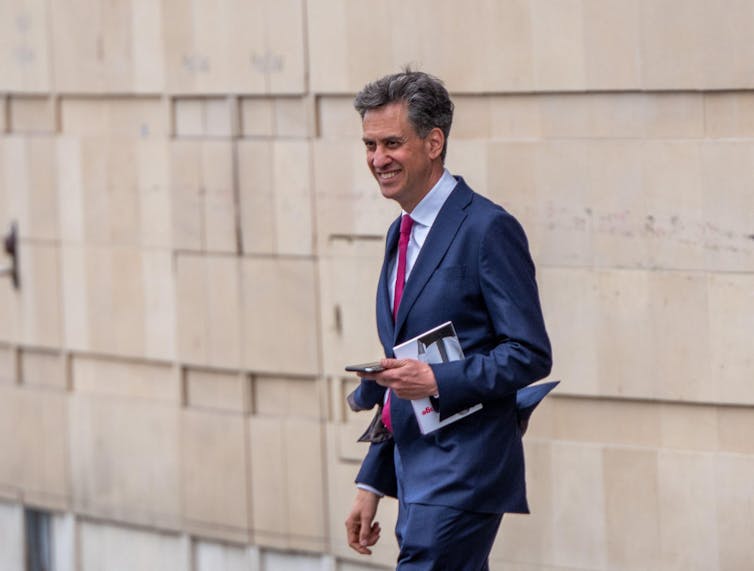It’s 100 years since the Labour party took office for the first time, back then with a minority government. Now, in 2024, it looks set to win an election with what will possibly the largest majority in history.
Labour has been out of power for 14 years, so the majority of its shadow cabinet has never held a ministerial post. Is this lack of experience a problem?
Labour had a total of 202 MPs after the 2019 election – its worst result since 1935. By the eve of the election in 2024, it had a core legacy of 170. Byelection wins had added 13 MPs to the party over the course of the parliament but seven MPs also resigned, two were sitting as independents (including former leader Jeremy Corbyn) and 36 MPs had decided to stand down.
The “core legacy” is the group of Labour MPs who are seeking to remain in the House of Commons by standing as candidates in the election. This is the starting base for the new parliamentary Labour party (PLP) – 170 MPs. There are also 12 former Labour MPs who are putting themselves forward in the election. Although not part of the core legacy base, these “retreads” will also bring important experience.
The latest polls put Labour ahead by between 18 and 26 points. The first MRP poll on June 3 projected a Labour majority of 194 – the highest ever – with 422 seats. Labour’s previous high watermark was the 418 seats won in 1997.
Polls can always be debated and, doubtless, the projections will shift over the course of the campaign, but this first MRP poll is a starting point as useful as any other to get an indication of what the PLP would look like after the election.
On these figures, all 12 retreads will be elected, but the new PLP will be enormously inexperienced. A party of 422 would include the 170 core legacy MPs, the 12 retreads and 240 brand new MPs. So nearly 60% of the PLP will be entering the House of Commons for the first time.
Government in the UK requires around 125-130 posts to be filled. The outgoing government currently consists of 125 ministers servicing 143 posts. Of these 125-130, the party of government can appoint a maximum of 109 parliamentarians to paid government jobs. A maximum of 95 of those can be MPs. The current government has 108 paid ministers – 91 in the House of Commons and 17 in the House of Lords.
The incoming government will therefore need to find up to 95 members of the House of Commons to serve as ministers, legal officers, and whips.
The cabinet and senior ministers will also normally have unpaid parliamentary private secretaries to help them with their roles. This would add a further 40-50 MPs to the government team. In total then, something of the order of 135-140 MPs will be heading into government roles.
The most likely candidates are the MPs that make up the core legacy and the retreads. But the thin experience of the core legacy is an issue, too. Only three of the current 31 members of the shadow cabinet have had any ministerial experience at cabinet level in government. Hilary Benn served in Labour cabinets from 2003-2010, while Ed Miliband and Yvette Cooper each served for two years between 2008-2010. A further six of the current shadow cabinet have some ministerial experience – including two who attended cabinet – John Healey and Pat McFadden. As in 1997, this absence of experience reflects the fruitless years of opposition.

Of the 31 members of the current shadow cabinet, 11 served in some capacity or other in Corbyn’s shadow cabinets. None of the remaining 20 did so. Five resigned from their posts in the 2016 “coup” against Corbyn, six were still serving in the shadow cabinet by the 2019 election.
The lack of experience in context
This doesn’t, of course, sound promising – until you look back at recent history to put it all into context. In reality, this lack of experience is a challenge, but not inherently a problem.
Only two of the last seven prime ministers have been without any formal government experience at all before assuming office – Tony Blair and David Cameron. All the others - Gordon Brown, Theresa May, Boris Johnson, Liz Truss and Rishi Sunak – had some degree of ministerial experience before assuming the office.
Arguably, Blair and Cameron were the best two out of the last seven. They certainly lasted the longest – Blair for ten years and Cameron for six.
The new government will need to quickly come to terms with its new role and will do so with a large majority, an inexperienced core of both ministers and MPs and a legacy and inheritance that seems likely to be much more difficult than in 1997.
To ensure this doesn’t become a problem, the situation certainly needs careful political and party management – but that is not impossible.

